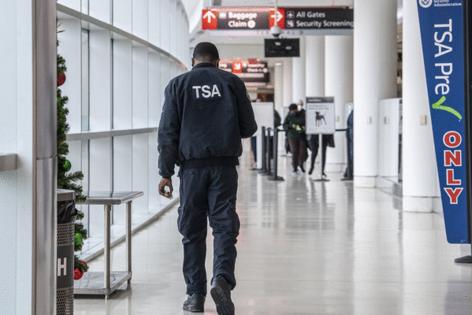Air travel disruptions add pressure on Congress for shutdown deal
Published in Political News
WASHINGTON — U.S. air travel is starting to show signs of strain as lawmakers remain divided over a government shutdown that has stretched into its second week.
Flight delays caused by air traffic control staffing shortfalls have rippled across the country, impacting airports in Dallas, Chicago, Nashville and outside Washington, D.C., as controllers are forced to work without pay.
Inbound flights to Newark Liberty International Airport in New Jersey were experiencing delays of more than an hour late Thursday afternoon due to staffing issues, according to an advisory from the Federal Aviation Administration. The Trump administration has also warned that flights to rural airports could end as soon as this weekend before additional funding was found to secure them until early November.
The U.S. air travel disruptions, which hurt both passengers and airlines, are among the most visible examples of how the shutdown is inconveniencing Americans. They present a political liability that could serve as a catalyst to the White House and Congress cutting a deal to fund the government.
The increase in delays is largely tied to more air traffic controllers calling out sick as the shutdown drags on, Transportation Secretary Sean Duffy said in a Fox Business TV interview on Thursday. Typically, the amount of delays caused by controller staffing shortages is about 5%, a figure that’s now grown to 53%, he said.
“It’s a small fraction of people who don’t come to work that can create this massive disruption,” Duffy said.
While there’s limited appetite in Congress for now for a quick resolution, airport chaos has previously helped prod the government into reopening. In 2019, as the nation’s longest-ever shutdown reached 35 days, air traffic controllers at critical facilities in Virginia and Florida called out sick, slowing air travel across the eastern seaboard and triggering a temporary halt to flights into and out of New York’s LaGuardia Airport, Philadelphia International Airport, and Newark.
That same day, President Donald Trump backed down, agreeing to sign a continuing resolution and reopen the government.
Applying pressure
The Transportation Security Administration has also warned that passengers going through security checkpoints could experience longer wait times.
“Travelers are facing longer TSA lines and flight delays. Airports are reducing flights and we’ve seen entire control towers go dark,” the U.S. Travel Association said in a statement Wednesday. The group estimates that the shutdown is costing the American travel economy $1 billion in lost spending each week.
The bulk of the shutdown pain has so far been borne by federal workers — some 750,000 who are furloughed and more than one million who continue to report to work — who have their income suspended until the shutdown is over.
But the air travel system’s vulnerability to cracking even with just slightly higher numbers of air traffic controllers and security personnel failing to show up for work demonstrates how lawmakers could soon face severe political outrage from constituents.
While flight delays and cancellations have ticked up as the shutdown has progressed, they haven’t yet swelled to unusual highs.
Lawmakers after the 2019 government funding lapse acknowledged that disarray at major airports heightened the urgency to end the shutdown, especially as polls showed the public increasingly blamed Trump and Republicans for the chaos.
The GOP this time around is also sounding the alarm on air travel, while trying to foist the blame for the shutdown on Democrats.
“While air traffic controllers are going to continue to serve in their posts, thankfully, critical safety inspections are going to stop, increasing risk for air travelers,” House Speaker Mike Johnson of Louisiana told reporters Wednesday. “That affects everybody.”
All work, no pay
The longer that shutdowns persist and the more paychecks controllers and TSA agents miss, the more apt they are to take sick leave, based on trends from past shutdowns. Those missed paydays make it harder for many to meet basic living expenses, including child care or commuting costs, prompting them to stay home. The average TSA screener makes about $51,000 a year, according to 2023 data from the Bureau of Labor Statistics.
TSA, in a since-deleted statement from the 2019 shutdown, said its rate of unscheduled absences reached as high as 10% — up from about 3% during the same period the year before. The agency said that many of its employees reported that they weren’t able to show up for work “due to financial limitations.”
The TSA in a statement Wednesday said that it has “not experienced any delay in operations due to callouts, and remains fully capable of facilitating safe and secure travel for passengers.”
The shutdown only adds more stress on air traffic controllers who should be focused on keeping the airspace safe rather than worrying about whether they’ll get their next paycheck, Duffy said during a press conference at Newark Liberty International Airport on Monday.
They still need to show up to work, he said in Thursday’s Fox Business interview. Those who aren’t dedicated to their jobs will be at risk of losing them, he added.
Members of Congress representing rural areas — including large swaths of upstate New York, Alaska and western Kansas — got a brief reprieve after Duffy announced Wednesday that $41 million was secured to keep the Transportation Department’s Essential Air Service running through early November.
That program provides subsidies for routes to small airports that wouldn’t otherwise be profitable for the airlines. The Transportation Department had earlier warned that funding for the program would lapse on Sunday and any carriers who scheduled flights beyond that day would “do so at their own risk,” according to a letter seen by Bloomberg.
Some airlines, including American Airlines Group Inc. and SkyWest Inc., said in statements that they intended to keep routes operating in the near term, regardless.
_____
(With assistance from Aashna Shah and Caitlin Reilly.)
_____
©2025 Bloomberg L.P. Visit bloomberg.com. Distributed by Tribune Content Agency, LLC.
























































Comments